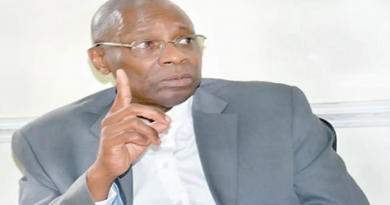Nigerian businesses need reformulation to stimulate growth -Expert
In order to fulfil Nigeria’s potential of stimulating economic prosperity, a reformulation of the nation’s business paradigm both theoretically and experimentally must be achieved says Dr. Ayodele Ibrahim Shittu.
Shittu, an expert in Entrepreneurship and Business Innovation Economics, who lectures in the Department of Economics, University of Lagos, whilst delivering the lead paper titled, “Transforming Business and Economy Through Innovation” during the #WorlstageEconomicsummit2017, explained that commitment, consistency, and sincerity of purpose on the part of the business and political leaders and followers is required to transform the Nigeria’s business environment for greatness and prosperity.
According to him, Nigeria’s business environment was yearning for innovation in order to fulfil its potential of stimulating economic prosperity. In view of this, Shittu noted that as a nation, Nigeria must promote collaborative relationships between the university and our industries.
He also said the nation must develop SMART focus for specific economic sectors, promote knowledge sharing between the enterprises in both formal and the informal sectors, put in place physical centers such as business incubators, accelerators, etc, encourage innovative supply of infrastructure and utilities as well as prioritize innovative financing options to both existing and new businesses.
His paper which assessed Nigeria’s business environment on the basis of three indicators (i.e. ease of doing business, business confidence, and capacity utilization), revealed that Nigeria’s performance on the ease of doing business over the last eight years which depicts an increasing trend, implies a woeful performance between 2008 and 2016, where Nigeria ranked 169th position among 190 economies around the world.
According to him, this consistent diminishing in ranking was considered embarrassing to us as a nation, and as such, nudged the Federal Government in its wisdom to set up the Presidential Enabling Business Environment Council to supervise the competitiveness and investment climate agenda at both federal and state levels in the country.
On Nigeria business confidence index, Shittu noted that there is a glooming perception of the business environment among leading firms in selected sectors of the Nigerian economy.
“Since the first quarter of the 2016 FY through the second quarter of the 2017 FY, we have witnessed negative perceptions of business activities in the country. While the level of pessimism is declining, common constraining factors cited among the firms surveyed include financial barriers, unfavourable political climate, competition, and insufficient local demand.” He said.
Although, Shittu stated that, this should not come as a surprise to all of us, giving that we are witnesses to the countless foreign trips embarked upon by our leaders to woo foreign investors.
He disclosed that, “Unfortunately, for majority of them, their search for vineyard yielded only thorns and rotten fruits as indicated in the erratic increase in Nigeria’s foreign direct investment (FDI) inflow from 2014 till date.
Speaking on notable factors that have contributed to our declining level of competitiveness which include health, education, and security. Shittu explained that, Nigeria’s educational system, if not prioritized, may see reduction in future human capital.
“The available evidence, in this regard, shows that the score of the skills of the future workforce sub-pillar is lower than the score of the current workforce by 10 percent or more.”
He noted that Nigeria is ranked 108/135 on the Business Dynamism and 90/135 on the Innovation Capacity indicators, but despite these, Nigeria remains the best in Sub-Saharan Africa in terms of market size.
According to him, some Notable private sector initiatives some of which are the “Business Environment Legislative Review Report,” which was prepared by the Nigerian Economic Summit Group (NESG) and successfully delivered to the National Assembly; and the “Business Environment and Competitiveness across Nigerian States” (BECANS), which was initiated by the African Institute for Applied Economics (AiAE), professes that appropriate regulatory and legislative instruments, as well as independent evidence-based research matters for the development of an enabling business environment.
“However, up until date, it is unfortunate that the task of creating an enabling business environment for the purpose of promoting national prosperity in this country remains a mirage.”
He stated that more still needs to be done in order to create the change that we all desire. Acknowledging the progress made so far, Dr. Shittu stressed that now is the time to take action, which does not connote the business as-usual attitude.
“Instead, we need to rethink our business culture and create innovative approaches to creating, nurturing and developing transformed local businesses with global outlook. But we must bear in mind that the process of transformation is not linear,” he advised.




